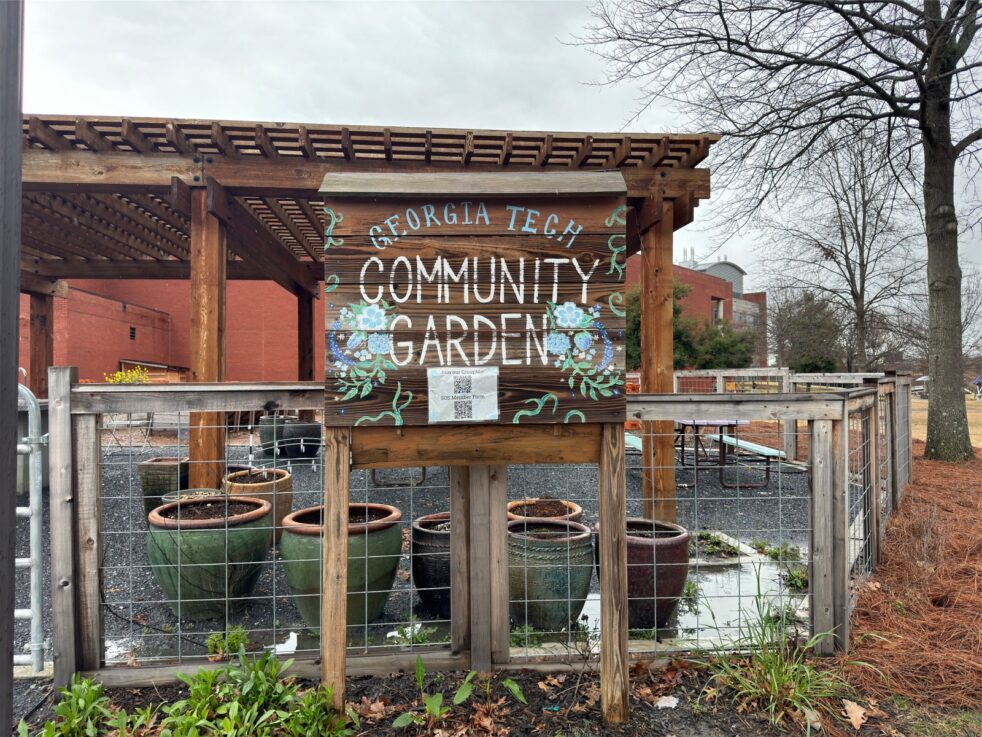In large cities, many people wonder where they can grow plant life. This has given rise to urban agriculture. Since Tech is in the center of Atlanta, people may be surprised at how a college campus in the middle of a big city is able to provide and grow plant life.
The Institute continues to place high importance on sustainability. One of the largest symbols of sustainability on campus is the Leadership in Energy and Environmental Design (LEED) certified net-positive Kendeda Building. In addition to administrative efforts, students are equally invested in this mission.
Students Organizing for Sustainability (SOS) is a student-run organization where students work to lead sustainability efforts on campus and in the community. Of their subgroups, the Urban Agriculture Project is dedicated towards urban agriculture development on campus. Urban Agriculture Project lead, Lainey Render, third-year CE major, spoke with the Technique about campus initiatives and the impact that urban agriculture can have.
“Most of what we do is maintain the Kendeda rooftop garden, but … a closer team of the uUrban [agriculture] group are working on spreading that around campus and adding more opportunities for more people to get involved,” Render said on student support.
She explained that the small, dedicated group of approximately 20 student volunteers work to bring sustainability through urban agriculture at the Institute.
Render continued, explaining that urban agriculture “is anything that’s working on cultivating food in an urban space… my personal definition is anyone trying to grow anything in an urban area.” She emphasized the role urban agriculture can have in combating food insecurity.
She further expanded on urban agriculture in the realm of the Tech community and SOS. She explained how the growth of the urban agriculture group helps the Institute as a whole as they strive to teach their sustainability and carbon-neutral initiatives.
“The main focus was to maintain the rooftop garden at the Kendeda Building… [I] think it’s really cool to maintain or to utilize rooftop spaces in urban settings for food production. Just because it’s an underutilized space that … uses some of the heat and energy from the building without necessarily requiring an external energy source,” Render stated.
She went on to explain the impact plant life can have on the energy of the building. While there are several ways the plants benefit from being at the Kendeda Building, the building also experiences large benefits from the plants.
“The actual garden is helping … lowering carbon emissions from the actual building, so I think it’s really a beneficial system all around and then you have a local source of food, which I think is important for everyone to have access to,” Render said.
The Urban Agriculture group is also having a large impact on the students involved as well.
Render talked about how Tech students can get a larger understanding of “how you can incorporate the products that you can produce into your life.”
In regards to the importance of urban agriculture at Tech, Render explained, “I think providing a way to teach people about urban agriculture and how to sustainably source your own food [with] the socioeconomic aspect of it, as well as the environmental aspect of it.”
The Urban Agriculture team works closely with the Kendeda Building and their administration to ensure their missions work in tandem with one another.
“We have to make sure that everything that goes into our garden is sustainably sourced… we don’t add any pesticides to the garden … so that’s just another aspect of the zero waste,” Render said.
She followed up, adding that everything from the garden is either composted or used around campus in other forms.
One of the newest initiatives that is being started is an aspect known as Mini-Gardens. Render described how this is a new way of allowing students to become interested in gardening and building awareness regarding the accesability of gardening.
“If we really want more students to be aware of the things we’re doing and like more people to be conscious of, like all those other things I talked about with, like food insecurity, food production, sustainable agriculture and all, like everything under the sun like that, we kind of have to, we have to make it really commute for them like it has to be [up front for them],” Render said.
Render continued by explaining the potential upcoming projects to create more awareness.
“So we have plans for a vertical vegetable garden as well as maybe like a tea garden and pots above ground. And then, like some blueberry bushes or like small fruit trees, something along those lines in different places around campus. And we’ll be tracking community engagement with those things and receiving community feedback about, like, which things were like[d],” Render said .
The locations of these were determined by conducting surveys of students for where Tech students would like to see these Mini-Gardens taking place at.
When asked about the biggest takeaway students should have urban agriculture as a whole and the urban agriculture team on campus, Render said “When you actually get involved in this space, you realize there’s ways to make it work successful and as long as you are aware of what climate you’re in and aware of, you know what types of plants will work in that climate… so it’s something that isn’t too hard to get involved in …and [you can] see the environment and the community around you also can get so much benefit out of…[It] really transforms the way you see, like our like Food Network, I’d say.”
With limited spaces and population, urban agriculture is an area rapidly on the rise. The current on-campus project provides new ways for students to learn about this field and spread a fresh, accessible method of sustainability.
For those interested, more information can be found at www.livingbuilding.gatech.edu.
